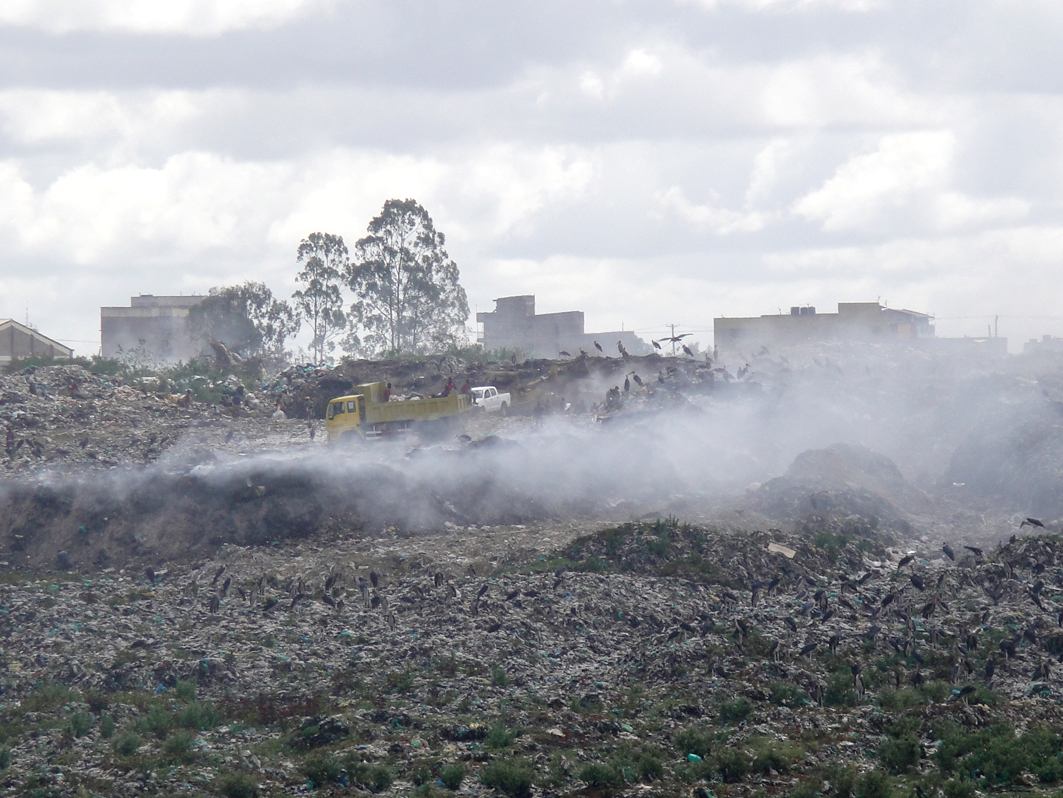More than 100,000 people live around the dumpsite, a 13-hectare grey zone in the eastern Korogocho slum area of Nairobi, where children grow up deprived of basic services such as water and electricity and play on smelly waste ground, around rotting food, broken bottles, medical waste and much more.
“Because of the toxic fumes, every day people come to the Catholic Dispensary with chest pain and breathing problems,” said Father Paolo, from the Comboni missionary in Korogocho.
A 2007 UN Environmental Programme (UNEP) report highlighted the prevalence of respiratory and gastro-intestinal problems, skin infections and different kinds of cancer among residents living close to the dumpsite. UNEP called for immediate action in either regulating waste collection or relocating the dump.
“Little progress has been made on the recommendations and people keep on getting sick,” Comboni’s Father John told IRIN.
However, Michael Njoroge, 26, who works at the dumpsite collecting paper and steel to sell, did not want the dumpsite relocated, despite experiencing chest pain and breathing problems for the past three years. “This is my only source of income,” he told IRIN. “If the dumpsite moves, I will follow it.”
Cash from rubbish
Recyclable waste is a profitable business: every day, children from slums around Dandora go to the dumpsite in search of food, recyclables and other valuables they can sell.
With 1kg of plastic selling for KSh2 (about US$0.03), in a day one can earn an average KSh50 ($0.67), John Webootsa, a Catholic priest and coordinator of Kutoka Network, which is lobbying for the closure of the dumpsite, told IRIN.
Webootsa said whatever is collected is then sold off to middlemen, the “scavengers”, who sell it to companies for recycling.
The poor are the best recyclers in the world. Nothing gets wasted but they should have an alternative to earn an income without having to put their health and lives in danger.
“If a controlled and well-managed waste-processing system is established, the health and environmental impact would be reduced while generating jobs and income for the local community,” he told IRIN.
Medical records collected by the Kutoka Network show that between 2004 and 2009 there was a 44 percent increase in the number of patients treated at the Catholic Dispensary. Respiratory cases went up from 765 to 3,356 in the period.
In the UNEP study, samples taken from 328 children aged two to 18 living around the dumpsite showed low haemoglobin, and iron deficiency anaemia, which are symptoms of lead poisoning, according to experts. Some of the children were also suffering from chronic bronchitis and asthma.
Soil samples from the site showed dangerously high levels of lead, mercury and cadmium.
Half the children tested had concentrations of lead in their blood exceeding internationally accepted levels, while 42 percent of the soil samples recorded lead levels almost 10 times higher than what is considered unpolluted soil (over 400 parts per million against 50).
A cleaner Dandora
On 10 December, Kutoka launched a “Stop Dumping Death on Us” campaign to lobby stakeholders for the closure of Dandora, its relocation to a non-residential area and the creation of a recycling plant. They are also advocating for alternative jobs for those living off the dumpsite.
The campaign brought together government representatives and is aimed at improving the livelihoods of the people living in the Korogocho area. At present, children are still going to the dump to collect trash, putting their health at risk, said Kadija Juma, a representative of the Korogocho Slum Upgrading Programme, a joint initiative of the governments of Kenya and Italy.
An Integrated Solid Waste Management plan for Nairobi is being developed and UNEP is supporting the City Council of Nairobi, the National Environment Management Authority and relevant government ministries in developing it.
It will incorporate waste minimization, segregation, collection, transportation, reuse/recycle, resource recovery, treatment and disposal to maximize resource efficiency, Annemarie Kinyanjui from the Division of Technology, Industry and Economics at UNEP, told IRIN.
A sanitary landfill for the city is also expected to be established.
Kinyanjui added that the plan would incorporate awareness raising and capacity building on proper waste management.
UNEP plans to launch it in early 2010 at a national workshop, for replication in other East African cities. “The hourglass for Dandora is flowing and people at Korogocho will get back their right to health and life,” said Kinyanjui.
cp/am/mw
This article was produced by IRIN News while it was part of the United Nations Office for the Coordination of Humanitarian Affairs. Please send queries on copyright or liability to the UN. For more information: https://shop.un.org/rights-permissions





